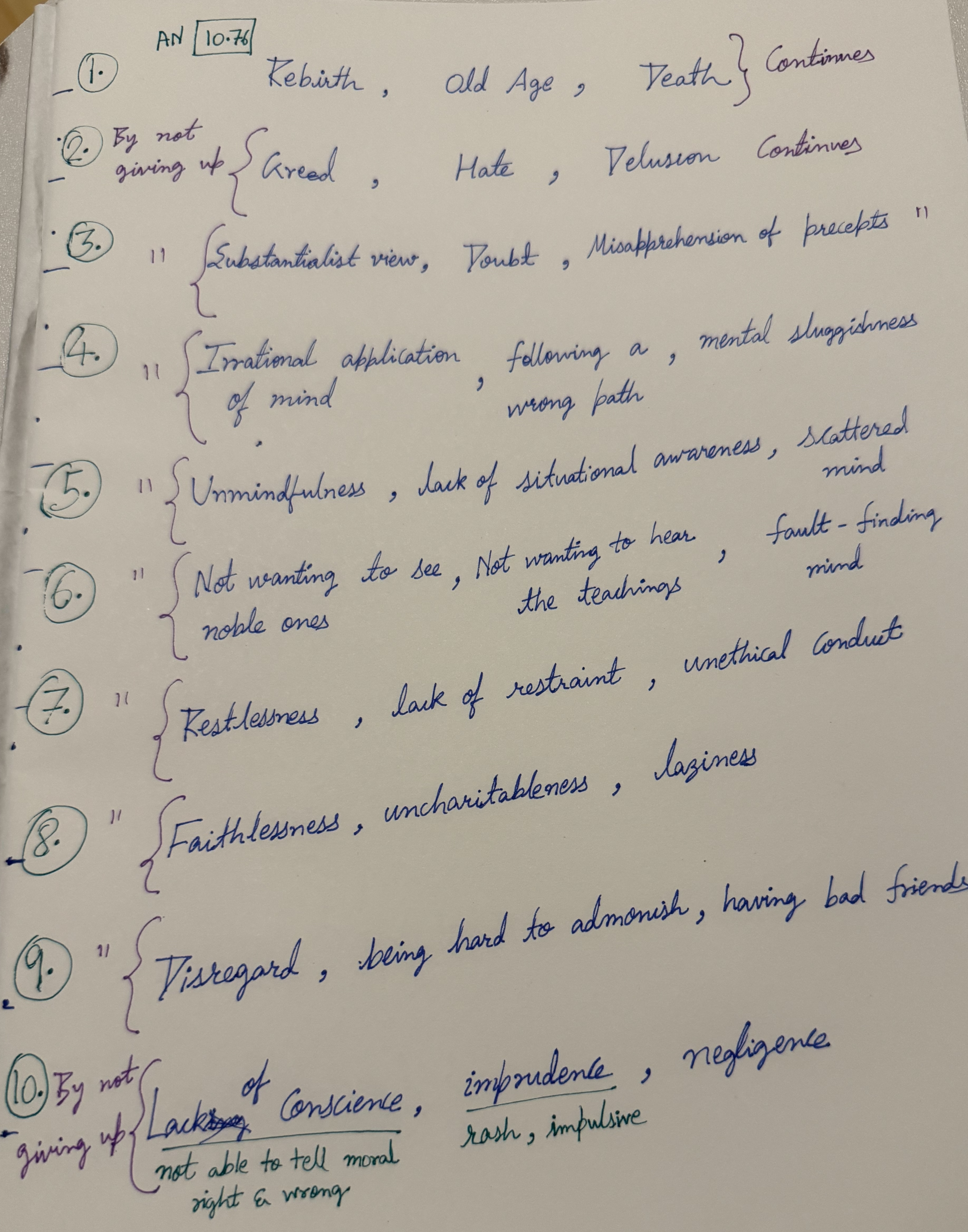The Buddha lays down 30 different mental qualities in ten sets of threes that lead all the way to enlightenment. He explains them both backwards and forwards. One can use this teaching to draw out a skill map of which qualities they’ve cultivated and which ones are next to cultivate.
Tayodhammasutta—Bhikkhu Sujato

1.
“Mendicants, if three things were not found, the Realized One, the perfected one, the fully awakened Buddha would not arise in the world, and the teaching and training proclaimed by the Realized One would not shine in the world.
What three?
Rebirth, old age, and death.
If these three things were not found, the Realized One, the perfected one, the fully awakened Buddha would not arise in the world, and the teaching and training proclaimed by the Realized One would not shine in the world.
But since these three things are found, the Realized One, the perfected one, the fully awakened Buddha arises in the world, and the teaching and training proclaimed by the Realized One shines in the world.
2.
Without giving up three things you can’t give up rebirth, old age, and death.
What three?
Greed, hate, and delusion. Without giving up these three things you can’t give up rebirth, old age, and death.
3.
Without giving up three things you can’t give up greed, hate, and delusion.
What three?
Substantialist view, doubt, and misapprehension of precepts and observances. Without giving up these three things you can’t give up greed, hate, and delusion.
4.
Without giving up three things you can’t give up substantialist view, doubt, and misapprehension of precepts and observances.
What three?
Irrational application of mind, following a wrong path, and mental sluggishness.
Without giving up these three things you can’t give up substantialist view, doubt, and misapprehension of precepts and observances.
5.
Without giving up three things you can’t give up irrational application of mind, following a wrong path, and mental sluggishness.
What three?
Unmindfulness, lack of situational awareness, and scattered mind.
Without giving up these three things you can’t give up irrational application of mind, following a wrong path, and mental sluggishness.
6.
Without giving up three things you can’t give up unmindfulness, lack of situational awareness, and scattered mind.
What three?
Not wanting to see the noble ones, not wanting to hear the teaching of the noble ones, and a fault-finding mind.
Without giving up these three things you can’t give up unmindfulness, lack of situational awareness, and scattered mind.
7.
Without giving up three things you can’t give up not wanting to see the noble ones, not wanting to hear the teaching of the noble ones, and a fault-finding mind.
What three?
Restlessness, lack of restraint, and unethical conduct.
Without giving up these three things you can’t give up not wanting to see the noble ones, not wanting to hear the teaching of the noble ones, and a fault-finding mind.
8.
Without giving up three things you can’t give up restlessness, lack of restraint, and unethical conduct.
What three?
Faithlessness, uncharitableness, and laziness.
Without giving up these three things you can’t give up restlessness, lack of restraint, and unethical conduct.
9.
Without giving up three things you can’t give up faithlessness, uncharitableness, and laziness.
What three?
Disregard, being hard to admonish, and having bad friends.
Without giving up these three things you can’t give up faithlessness, uncharitableness, and laziness.
10.
Without giving up three things you can’t give up disregard, being hard to admonish, and having bad friends.
What three?
Lack of conscience, imprudence, and negligence.
Without giving up these three things you can’t give up disregard, being hard to admonish, and having bad friends.

Mendicants, someone who lacks conscience and prudence is negligent.
When you’re negligent you can’t give up disregard, being hard to admonish, and having bad friends.
When you’ve got bad friends you can’t give up faithlessness, uncharitableness, and laziness.
When you’re lazy you can’t give up restlessness, lack of restraint, and unethical conduct.
When you’re unethical you can’t give up not wanting to see the noble ones, not wanting to hear the teaching of the noble ones, and a fault-finding mind.
When you’ve got a fault-finding mind you can’t give up unmindfulness, lack of situational awareness, and a scattered mind.
When your mind is scattered you can’t give up irrational application of mind, following a wrong path, and mental sluggishness.
When your mind is sluggish you can’t give up substantialist view, doubt, and misapprehension of precepts and observances.
When you have doubts you can’t give up greed, hate, and delusion.
Without giving up greed, hate, and delusion you can’t give up rebirth, old age, and death.
… The teaching continues sharing the sets of three in the order of cultivation …

Mendicants, someone who has conscience and prudence is diligent.
When you’re diligent you can give up disregard, being hard to admonish, and having bad friends.
When you’ve got good friends you can give up faithlessness, uncharitableness, and laziness.
When you’re energetic you can give up restlessness, lack of restraint, and unethical conduct.
When you’re ethical you can give up not wanting to see the noble ones, not wanting to hear the teaching of the noble ones, and a fault-finding mind.
When you don’t have a fault-finding mind you can give up unmindfulness, lack of situational awareness, and a scattered mind.
When your mind isn’t scattered you can give up irrational application of mind, following a wrong path, and mental sluggishness.
When your mind isn’t sluggish you can give up substantialist view, doubt, and misapprehension of precepts and observances.
When you have no doubts you can give up greed, hate, and delusion.After giving up greed, hate, and delusion you can give up rebirth, old age, and death.”
Read this teaching in full over here: https://suttacentral.net/an10.76.
The Buddha shares a map of 30 different qualities that one can actively reflect on to independently verify the truth of whether this map holds up till the level of cultivation of their own qualities.
As you’re learning the teachings of the Buddha with diligence, actively reflecting to independently verify them, you’re already more than half way through the cultivation of these mental qualities. By continuing to practice these alongside to build your practice, you can slowly but surely cultivate the higher mental qualities.
The giving up of doubt as experiential confidence, not holding to a fixed view and following of precepts gradually comes into being as one is awakening to enlightenment.
Related Teachings:
- Eight harmful and beneficial qualities ↗️ - Cultivating diligence, being energetic, good friendships and other qualities along with their counterparts are explained here. These should be developed first.
- Gradual training, gradual practice and gradual progress ↗️ - Then as one is learning the teachings of the Buddha, they can cultivate the path as laid out hear to develop the higher qualities of mindfulness, singleness of mind, rational application of mind.

